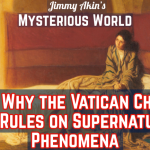
 Jimmy Akin's Mysterious World
Jimmy Akin's Mysterious World Why the Vatican Changed Its Rules for Evaluating Supernatural Phenomena (Apparitions, Visions, Eucharistic Miracles, Catholic, Vatican, Dicastery for the Doctrine of the Faith)
Jul 19, 2024
Jimmy Akin and Dom Bettinelli discuss the Vatican's new rules for evaluating supernatural phenomena, emphasizing the clarity needed for discernment. They explore the shifts in language, criteria adjustments, and controversies surrounding Marian dogma requests. The importance of efficient ecclesiastical discernment, collaboration, and understanding human elements in apparitions is highlighted.
AI Snips
Chapters
Transcript
Episode notes
Holy Spirit Active in Supernatural
- Cardinal Fernandez affirms that God and the Holy Spirit actively work in the Church through supernatural phenomena like apparitions.
- These events enrich faith and devotion, and the Church should not stifle but appreciate and promote them.
Problems with 1978 Norms
- The 1978 norms caused delays and confusion because bishops made overly definitive statements on apparitions.
- Some bishops prematurely declared apparitions supernatural or obligatory for faith, contradicting Church teaching that belief is not required.
Use Nihil Obstat for Efficiency
- Use the "Nihil obstat" decision to approve supernatural phenomena positively but without full supernatural declaration.
- This permits quicker pastoral work and clarifies belief in the phenomena is not mandatory.


 In May 2024, the Vatican issued new norms for how to evaluate reports of supernatural phenomena. In the first of a two-part discussion, Jimmy Akin and Dom Bettinelli examine how the new rules radically change the way these phenomena are classified.
In May 2024, the Vatican issued new norms for how to evaluate reports of supernatural phenomena. In the first of a two-part discussion, Jimmy Akin and Dom Bettinelli examine how the new rules radically change the way these phenomena are classified.